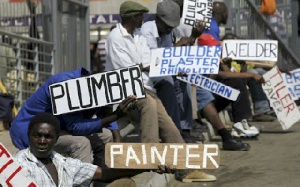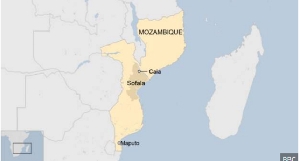- Home - News
- TWI News | TV
- Polls
- Year In Review
- News Archive
- Crime & Punishment
- Politics
- Regional
- Editorial
- Health
- Ghanaians Abroad
- Tabloid
- Africa
- Religion
- Election 2020
- Coronavirus
- News Videos | TV
- Photo Archives
- News Headlines
- Press Release
General News of Tuesday, 19 July 2016
Source: classfmonline.com
Unemployment biggest concern of Ghanaians: IEA study finds
A research conducted by the Institute of Economic Affairs (IEA) across Ghana has identified erratic power supply (Dumsor), unemployment and poverty as the three issues of utmost importance to Ghanaians ahead of the 2016 elections.
The results of the socio-economic and governance survey showed that unemployment (25.8%), poverty (23%) and unreliable electricity supply (16.3%) were the issues that citizens wanted government to put on its priority list.
Other problems outlined as important but of low priority include poor infrastructure, poor education, corruption, poor potable water supply, low income and salary, high prices of goods and services, crime, immigration as well as ethnicity.
The 2015 IEA survey on ‘The Most Important Problems Confronting Ghana’ collected the views of one thousand five hundred (1,500) citizens across all ten regions of the country in November and December 2015.
Five out of 10 regions of the overall results perceive poverty as an issue, which needs urgent attention. They include Upper West, Upper East, Northern, Brong Ahafo and the Central, which have a relatively higher number or rural dwellers. They want the governing National Democratic Congress (NDC) to deal with the poverty in those areas.
The Ghana Living Standards (GLS) survey of the Ghana Statistical Service (GSS) also shows that poverty is a rural problem.
Unreliable electricity supply ranked high in two out of the 10 regions: Ashanti (33%) and Greater Accra (31.5%). These two regions are largely urban and many businesses and industries are located within them.
It will be recalled that an IEA report in 2014 showed that businesses were collapsing. This was largely due to the power crises that affected the country for about four years that led to the collapse of some firms as well as downsizing of others.
The Volta Region (42%), Eastern Region (29%) and Western Region (28%) saw unemployment as an urgent problem that needed to be solved by the government. According to the report, urban dwellers are confronted with unemployment issues while poverty was the major problem for rural dwellers.
In terms of gender, more women were concerned about unemployment than their male counterparts. More women were also concerned about poverty than males, according to the survey.
However, a higher number of men were concerned about corruption than women.
Most age groups perceived unemployment as the biggest problems that need to be tackled, especially, those in the 18-23 (29.6%) age bracket. Those above 36 years also said poverty was a main concern, which needs to be tackled.
As part of its efforts to promote effective policy-making, the IEA conducts periodic surveys to seek public opinion on pertinent policy issues with the aim of bringing the concerns of the citizenry to the attention of the Ghanaian policy-maker.











